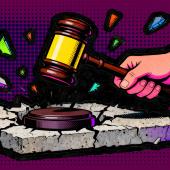
CHEAT SHEET
- Understanding the enemy. A “Rambo” litigator is defined as a generally negative lawyer that often abuses discovery and deposition practices in an attempt to win the case.
- Keep calm and carry on. It is essential to avoid engaging Rambo, as his or her tactic is to distract, frustrate, or anger you.
- Leave a paper trail. One of the best defenses to a Rambo litigator is keeping a record of all correspondence in an attempt to keep you and your client prepared for the worst.
- The ethics of Rambo. Under the Model Rules of Professional Conduct, you are required to report misconduct if it raises a “substantial question” about the other lawyer’s ability to practice law.
All attorneys will experience the misfortune of dealing with difficult opposing counsel at some point in their career. Some of these difficult lawyers take it to another level. We call these lawyers “Rambo” litigators. Rambo litigators confuse adversarial with acrimonious. They use rudeness as a weapon and they will violate rules of procedure and professionalism to gain a tactical advantage over their opponents. It is important to remember that you are under no obligation to respond to such provocation. You can still achieve your objectives with civility, poise, and professionalism. Herein, we will identify the Rambo litigator’s most common dirty tactics and provide you with the proper tools to disarm and defeat this difficult adversary.
Who is a “Rambo” litigator?
A Rambo litigator is an overly aggressive lawyer who uses intimidation and threat tactics while representing a client. These litigators also lack courtesy and professionalism in dealing with other lawyers. You may be familiar with US actor Sylvester Stallone’s action movie character John Rambo, who was known for responding to provocation with overwhelming force.
Like the movie character, Rambo litigators take an overly aggressive approach to their practice. Often, they use unethical or illegal tactics in the hopes of gaining an advantage over opposing parties and counsel. There is no perfect solution to the problem of the difficult opponent, but it is helpful to first understand the type of litigator with whom you’re dealing:
The bully lawyer
The bully lawyer is generally overbearing towards anyone with whom he deals. They make insults and personal attacks. They threaten you with motions, sanctions, and more. At depositions, you cannot get a question in without a speaking objection. Bully lawyers can be particularly hard on less experienced, female, or minority attorneys. The bully lawyer may be trying to size you up to see if and how far he or she can throw you off your game. They may also try to show off for their clients or try to make you look bad in front of yours.
The unprepared lawyer
The unprepared lawyer knows little about the case or the applicable law but blunders through and masks their ignorance with arrogance. They do not intend to be difficult, but are likely to be troublesome or absent because of their unfamiliarity with the applicable law. They may be concerned that the law does not favor their position.
The obstructionist lawyer
This lawyer is generally negative and will not agree to anything no matter how reasonable you try to be. They refuse to answer calls or correspondence and cause your case to drag on unnecessarily.
The unhappy lawyer
The unhappy lawyer is miserable practicing law and probably in other areas of their life too. This carries over into their dealings with other lawyers and people in general.
The paper tiger lawyer
This lawyer prefers to hide behind emails and letters telling you how poor your case is and why you cannot win. They will file motion after motion over issues that could have been resolved with a simple phone call. This lawyer will not return your calls and then claim by letter or email that you do not respond promptly to them. If and when you finally get this lawyer on the phone or in person, they aren’t difficult to deal with. However, they will then send you a letter completely contradicting what was just discussed.
Dirty tactics to watch out for
Written discovery
A Rambo litigator abuses the discovery process by serving excessive discovery requests that are unduly burdensome and overly broad; failing to respond to discovery requests within required timeframes; or submitting inadequate responses. He serves discovery for the purpose of harassment. The Rambo litigator loves to deliver discovery requests at 4:55 pm on a Friday or serve a motion after hours or during holidays.
Rambo lawyers may also refuse to give extensions when requested and move for sanctions if discovery responses are received a day late.
Inspections
A Rambo litigator may initially disguise their tactics by being extremely cooperative. For example, they tell you on the phone that you and/or your client’s expert may inspect the product without them. WARNING: DON’T DO IT! They may later accuse you of tampering with evidence, taking evidence, or destroying evidence. Always video record inspections of evidence.
Depositions
A Rambo litigator will often unilaterally notice a deposition without clearing the date with you and then refuse to reschedule. When defending a deposition, the Rambo litigator will make inappropriate or excessive speaking objections. They may attempt to “cue” their witness during deposition with verbal or non-verbal communication, lengthy objections, or other impermissible actions.
When taking depositions, Rambo litigators often use a sarcastic tone or make argumentative or repetitive inquires. They try to rattle the witness to throw them off, leaving the witness vulnerable to attack. A Rambo litigator may question the witness’s credibility or background to put them on edge.
Sound-bite questions are a popular tactic used in depositions of persons most knowledgeable within an organization. These questions are intended to elicit sound-bite responses that are really only marginally relevant but can leave a strong negative impression with the jury if they somehow get into evidence. The questioning attorney asks the witness a number of propositions that are very general and difficult for an unprepared witness to deny. The goal is to get this testimony on videotape and then show it to the jury, usually in the opening statement. The argument that follows is that the defendant is negligent because they did not abide by the very statements they agreed were applicable, i.e., violated their own standard of care.
Motions to compel
Rambo litigators will threaten motions and sanctions at the drop of a hat. They misrepresent your statements and actions to the court so that when you finally get in front of the judge, they don’t know who to believe. The Rambo lawyer likes to use colorful words like “frivolous” and “illogical” and will accuse your client of obstructing justice, intentionally hiding documents or information, and purposefully misleading the court.
Trial
Rambo litigators will do whatever it takes to win over a jury, including arguing outside the record and making up facts that help their case. They will push the limits and see how much and for how long they can get away with it.
More and more plaintiffs’ lawyers, including Rambo litigators, are employing the Reptile theory at trial, hoping that jurors’ primal instincts will override logic. Made popular by the book authored by David Ball and Don Keenan, “The Reptile” is a theory for trying plaintiffs’ cases by portraying the defendant’s conduct as a threat to jurors’ own safety and the safety of others. Sound-bite snippets from the defendant’s corporate representative are used to create feelings of fear or doubt, which the plaintiff ’s attorney then capitalizes on by empowering the jury and giving them the chance to “protect” others from such “unsafe” conduct.
Other Model Rules to consider when dealing with the Rambo litigator:
RULE 3.1 MERITORIOUS CLAIMS AND CONTENTIONS
This rule is intended to prevent against frivolous claims, defenses, or arguments. There must be a basis in law and fact which includes a good faith argument for an extension, modification, or reversal of existing law.
RULE 3.2 EXPEDITING LITIGATION
This rule requires lawyers to make reasonable efforts to expedite litigation consistent with the interests of the client.
RULE 3.3 CANDOR TOWARD THE TRIBUNAL
Pursuant to this rule, lawyers shall not knowingly make a false statement of fact or law to the court, fail to disclose to the court legal authority known to the lawyer to be directly adverse to his position and not disclosed by opposing counsel, or offer evidence that the lawyer knows to be false.
RULE 3.4 FAIRNESS TO OPPOSING PARTY AND COUNSEL
This rule addresses a number of actions to avoid, including unlawfully obstructing another party’s access to evidence, falsifying evidence, making a frivolous discovery request, and failing to make a reasonably diligent effort to comply with a legally proper discovery request by an opposing party.
RULE 3.5 IMPARTIALITY AND DECORUM OF THE TRIBUNAL
Pursuant to this rule, a lawyer shall not seek to influence a judge, juror, prospective juror, or other official by means prohibited by law or communicate ex parte with such person during the proceeding unless authorized to do so. Lawyers also shall not engage in conduct intended to disrupt the court.
RULE 4.1 TRUTHFULNESS IN STATEMENTS TO OTHERS
This rule provides that lawyers shall not make a false statement of material fact or law to a third person or fail to disclose a material fact when disclosure is necessary to avoid assisting a criminal or fraudulent act by a client, unless disclosure is prohibited by Rule 1.6 [Confidentiality of Information].
RULE 8.4 MISCONDUCT
This rule lists a number of actions that are considered to be professional misconduct, including violating or attempting to violate the Rules of Professional Conduct; committing a criminal act that reflects adversely on the lawyer’s honesty, trustworthiness, or fitness as a lawyer in other respects; engaging in conduct involving dishonesty, fraud, deceit, or misrepresentation; and engaging in conduct that is prejudicial to the administration of justice.
Weapons for combat
Don’t engage
As tempting as it might be to fight fire with fire, it does you and your client little good to do so. If Rambo raises their voice, lower yours. If they interrupt you, let them finish before you begin speaking. If they don’t return your calls promptly, make sure you always do. If you respond to Rambo tactics with Rambo tactics, you let them dictate your litigation strategy. As litigators, we don’t like losing. So remember that when you take the bait, you relinquish control of the situation to Rambo, whatever their motives might be. Respond in your own way; not anyone else’s.
For example, do not respond to Rambo’s discovery requests by issuing nearly identical discovery requests. Where does this get you? Not only do you stoop to Rambo’s level, but you risk your own credibility with the judge. There are also ethical concerns in issuing discovery that you know is overly broad and unduly burdensome. Most states have a Rule 11 similar to the Federal Rules of Civil Procedure which provides that “[b]y presenting to the court a pleading, written motion, or other paper…an attorney or unrepresented party certifies that to the best of the person’s knowledge, information, and belief… it is not being presented for any improper purpose, such as to harass, cause unnecessary delay, or needlessly increase the cost of litigation[.]” Fed. R. Civ. P. 11(b)(1). Do not put yourself at a risk for sanctions.
Keep calm and carry on
Not only must you avoid engaging Rambo in their dirty tactics, you must also keep your composure when doing so. Many lawyers use Rambo tactics to distract, frustrate or anger their opposing counsel who then fail to uncover all relevant information. Never let your emotions take control. The Rambo lawyer will do their best to make you mad because when you’re mad, you make mistakes. Showing Rambo that it doesn’t bother you is the best way to counter this tactic.
The hardest time to do this is during a deposition. If the Rambo litigator is bullying you or your witness, be civil but firm. Do not allow that lawyer’s poor conduct to dictate how you handle the work you do there. Take a break if you need a few moments to collect yourself so you can avoid making a rash decision. Consider the pros and cons of whether to terminate the deposition. Will court be sympathetic to your position? Will terminating just give the Rambo lawyer another bite of the apple?
When all other tactics fail, you may have to call the court. Do not be afraid to do so, especially if you are right. A lawyer may be Rambo at a deposition in front of you and your client but will back down to a judge.
Pick up the phone
Many Rambo lawyers hide behind emails and letters. You could spend time reacting to those communications that run up fees and costs without doing anything to advance your client’s case. Or you could try picking up the phone and calling them. Some Rambo lawyers will diffuse when you talk to them in person. Others will not — and then it’s best to limit verbal communication. A simple email or letter suggesting this approach based on your past interactions might be helpful. Even if you do get them on the phone, it is always good to follow up with some form of written correspondence confirming the conversation.
Document everything
Rambo lawyers are unreliable and untrustworthy, so be sure to protect yourself and your client by documenting everything that is said and done. It is also smart to send your communications in a way that gives you a signature showing that opposing counsel received it. Remember that any communication you send may end up in front of the court, so keep it professional. Stick with the facts and leave out any unnecessary commentary.
Have a good, qualified court reporter at arbitrations, depositions, and hearings. You may want to ask them to stay on the record unless you instruct him or her to do otherwise. Note clearly and concisely your objections on the record, especially if you think it will be necessary to support a motion to compel. Do not be bullied into having conversations off the record.
If there are any nonverbal actions, make sure to describe them for the record: “Let the record reflect that counsel has just packed up his things and left the room.” You may want to even videotape the deposition. Many difficult lawyers are less likely to cause trouble if the deposition is videotaped. The video record tells a different story than a written transcript.
Documentation can also be helpful in making a record of the difficult behavior itself. This may be needed down the road if you have to file a motion or otherwise involve the court or the disciplinary authorities.
Pick your battles. It is tempting to vigorously oppose everything the Rambo lawyer does. However, you’re probably better off distinguishing what conduct is reasonable and what is unreasonable and then responding appropriately. Contrary to the Rambo lawyer, not every extension request or deposition location needs to turn into a major battle. Do not make every issue into a fight. Your cooperation and courtesies will ultimately benefit you when you find yourself in front of the court.
Similarly, be judicious in filing motions with the court. Not every Rambo act calls for a sanction or a motion to compel. Wait until Rambo has clearly crossed the line before you call their behavior to the attention of the court. If you do so too early, the court is likely to conclude that the lawyers just do not get along.
Be prepared. A Rambo lawyer typically use incivility to mask their own insecurities, whether regarding the merits of their case or their own abilities. If you know the facts, the rules, and the law, you will be able to battle the Rambo lawyer with brilliance. Know the facts of your case and the controlling authority. Master the rules of evidence, procedure, and professional responsibility. In particular, be thoroughly familiar with the applicable rules of procedure for the jurisdiction so that you are confident in how you are conducting yourself. Many judges have their own rules, so be intimately familiar with those as well.
It is easier to be confident when you know that you are legally correct. A precise, pinpoint citation to the rule, clarifying why you are right and why Rambo is wrong, is often helpful. If you are in doubt about a particular point, call another attorney at the office and explain the situation. That person can do some research if needed on the disputed matter.
Prepare your client. Not only must you be prepared, but you must also prepare your client. Advise them in advance about what to expect, and advise them not to engage the Rambo lawyer on his level. It is particularly important to prepare your client representative for deposition. Specify which topics your witness will be responding to ahead of time and stay within those parameters. Familiarize your witness with one or more case themes (i.e., a home base) to which they can return when faced with a question they are unsure how to answer. Remind your witness to be credible and to stick with what they know. Prepare them for potential “sound-bite” questions as discussed above. When the Rambo lawyer gets animated, the witness should remain calm and remember that their audience — whether at deposition or at trial — is ultimately a jury.
Don’t be afraid to ask for advice
If you are a younger lawyer and this is your first time encountering a Rambo litigator, consider reaching out to your mentor or a more experienced lawyer for guidance and advice. Perhaps that person may have even dealt with this specific Rambo litigator before and can give helpful insight. The ACC’s Compliance and Ethics Committee is also a good resource when you are presented with new and difficult situations.
Ethics considerations
If the Rambo lawyer creates an ethical issue, such as making a misrepresentation of fact or law to the court, you may be required to report such misconduct to the appropriate authority.
Under the Model Rules of Professional Conduct, you are required to report misconduct if it raises a “substantial question” about the other lawyer’s fitness to practice law unless your knowledge of the misconduct is protected from disclosure. Many lawyers are reluctant to report a seemingly harmless violation of the rules, but if you know that another lawyer has violated any of the rules, you should check local policies to determine whether you have any discretion in deciding whether to report. Failure to report a lawyer’s misconduct could itself be a violation of the rules.
Conclusion
Dealing with a Rambo litigator is never easy, but armed with the proper weapons, you will be prepared for battle. Keep these tips in mind when confronted with a Rambo litigator, and remain professional. While Rambo tactics may allow them to come out ahead on occasion, more likely than not the judge will catch on eventually, and hopefully justice will be served.





